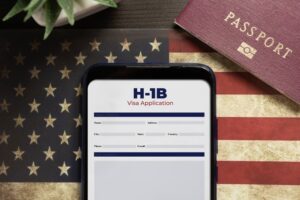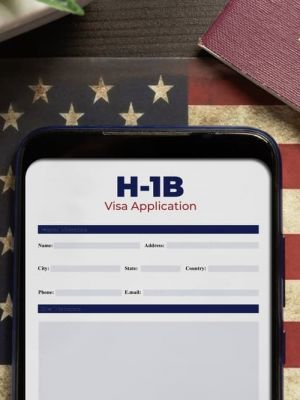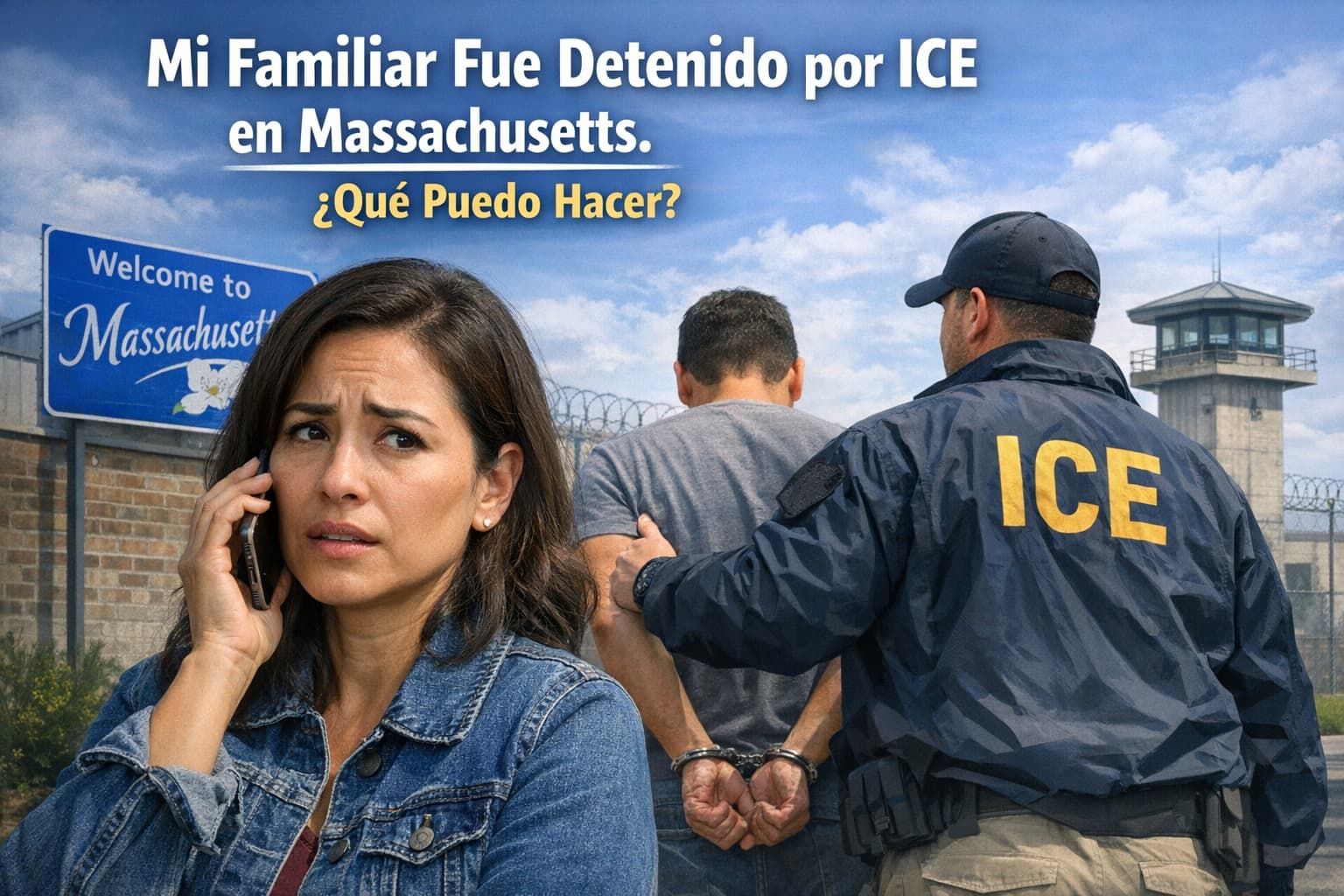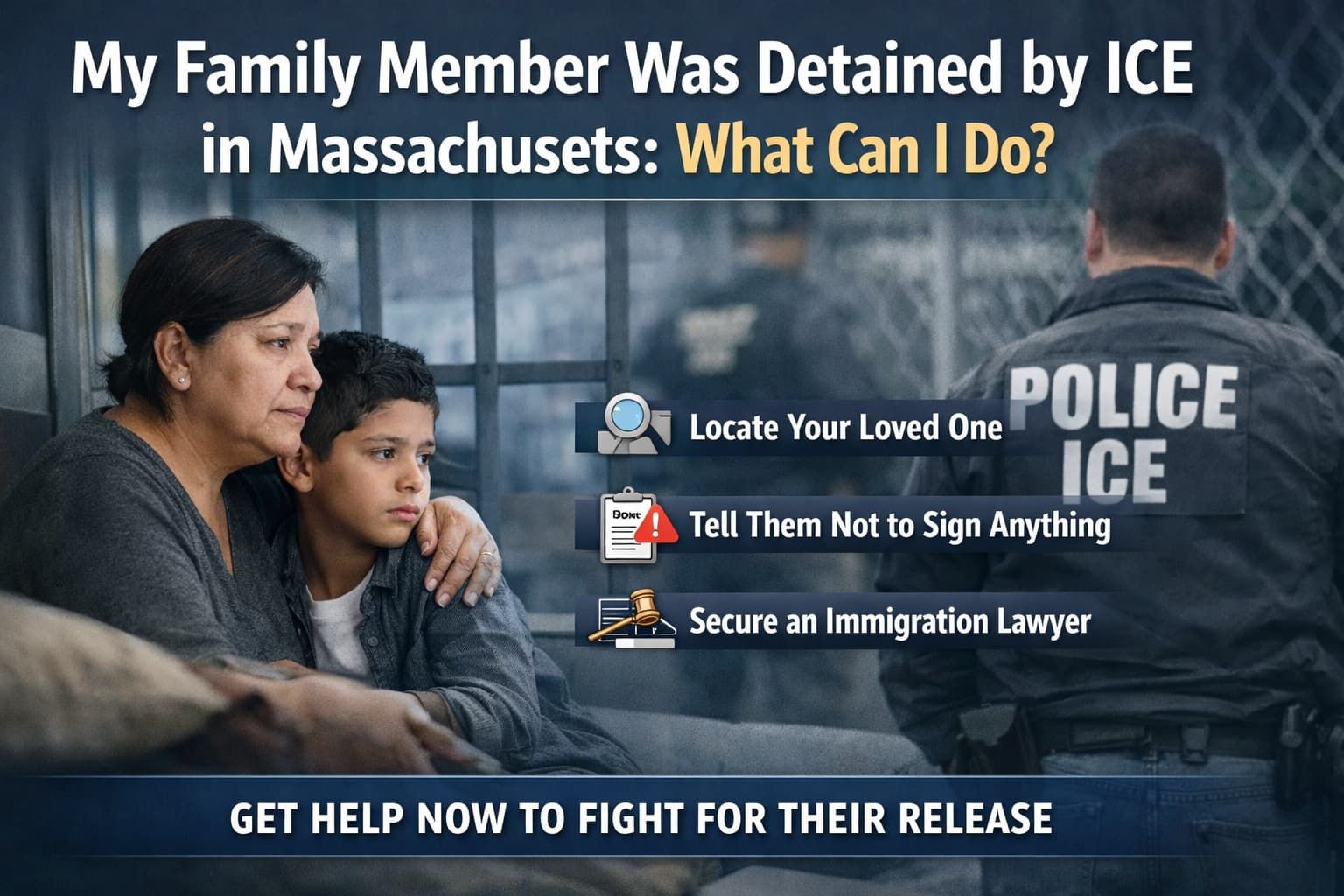What Is the H1B Visa Fee?
On Friday, September 19, 2025, President Donald J. Trump signed a proclamation that imposes a $100,000 fee on new H-1B visa petitions for foreign nationals entering the United States. This new fee does not apply to renewals, extensions, or individuals already in the country.
This charge, while significant, does not apply to renewals or current visa holders already in the country. The proclamation went into effect at 12:01 a.m. EDT on Sunday, September 21, 2025.
This sudden increase drastically affects employers, especially those in industries dependent on foreign talent, and raises serious questions for employees navigating their careers in the U.S.
For many, the complexities now extend beyond finances to include new logistical requirements and due diligence checks.
In this fast-evolving legal landscape, guidance from a Boston immigration lawyer from Brooks Law Firm can help clarify responsibilities, challenge unfair practices, and address legal issues tied to these unprecedented costs.
Are you concerned about how H1B visa costs may affect your business or employment? Explore your legal rights and options during a confidential consultation. Call (617) 245-8090 or complete a brief online form to learn more about the following legal insights.
Key Takeaways About the H1B Visa Fee
- Major Fee Increase: As of September 19, 2025, the H1B visa application fee has jumped to $100,000 per petition under a new executive order augmenting the Restriction on Entry of Certain Nonimmigrant Workers.
- New Compliance Hurdles: Beyond cost, employers now face additional logistical due diligence checks, making the process more complex and legally demanding.
- Industries Facing Big Changes: The steep fee particularly affects tech, healthcare, and higher education—industries that depend heavily on H1B talent.
- Legal Responsibilities and Risks: Employers must cover these fees and navigate new administrative requirements. Attempts to transfer costs to employees can create serious legal trouble.
- Value of Legal Guidance: Brooks Law Firm offers critical support for companies and professionals grappling with the new H1B visa regulations update, helping clients understand obligations, minimize risk, and adjust to the post-executive order landscape.
- Handling Complex Cases: Brooks Law Firm can assist employers and employees in addressing complex issues arising from the new H1B fee requirements, including responding to Requests for Evidence (RFEs) and ensuring compliance with all federal laws.
Breaking Down the H1B Visa Fee Structure
As of Friday, September 19, 2025, the H1B visa fee has changed dramatically.
The recent proclamation adds a $100,000 payment to the H-1B petition process for a specific group of applicants. This fee, which employers must pay, applies only to new H-1B petitions filed for workers currently outside the United States. This new cost is in addition to the standard H-1B fees that employers must pay.
Here’s what you need to know about its implications:
- Mandatory payment for petition approval: The fee must accompany the petition, and any missing or incomplete payments will result in immediate rejection.
- Increased financial burden on employers: Employers now face higher costs for hiring H1B workers, which could impact budgets, hiring strategies, and workforce planning.
- Compliance risks: Errors in payment or documentation can lead to delays, denials, or even legal scrutiny, making it critical to get every detail right.
- Potential for strategic legal adjustments: To adapt to these changes, businesses may need to explore alternative visa options, exemptions, or creative workforce solutions.
An immigration attorney can help ensure compliance with payment requirements, minimize risks, and identify opportunities to mitigate the financial and logistical impact of this fee. By working with legal counsel, employers can better protect their interests and move forward with confidence.
The Standard USCIS Filing Fee
 The base filing fee for the Form I-129, Petition for a Nonimmigrant Worker, is a required cost for all H1B petitions. Despite recent changes to the program, this fee remains unchanged and must be submitted correctly to avoid petition rejection.
The base filing fee for the Form I-129, Petition for a Nonimmigrant Worker, is a required cost for all H1B petitions. Despite recent changes to the program, this fee remains unchanged and must be submitted correctly to avoid petition rejection.
Key details include:
- Purpose of the fee: Covers the administrative costs of processing the H1B petition.
- Payment requirements: Missing or incorrect payment will result in petition rejection.
- Predictable cost: Unlike other fees, this charge has not increased under the new executive order.
Accurate payment of this fee is critical to keeping the petition on track.
ACWIA Training Fee
The American Competitiveness and the Twenty-first Century Act (ACWIA) fee supports U.S. worker training and education programs. This fee varies based on the size of the sponsoring company.
Here’s what to know:
- Fee variations: Smaller employers with 25 or fewer full-time employees pay a reduced fee, while larger companies face higher costs.
- Exemptions: Non-profit research organizations and higher education institutions may qualify for exemptions.
- Compliance with rules: Confirming eligibility for exemptions is important to avoid unnecessary costs.
Employers should carefully review their eligibility and payment obligations for this fee.
Anti-Fraud Fee H1B
The Fraud Prevention and Detection Fee applies to new petitions and employer transfers. It is designed to address fraudulent applications and remains a key part of the H1B process.
Important considerations include:
- Purpose of the fee: Funds government efforts to investigate and prevent visa fraud.
- Applicability: Required for all new petitions and when an employee transfers to a new employer.
- Risks of errors: Mistakes in payment or documentation can lead to delays or additional scrutiny.
Accurate payment and documentation are necessary to avoid complications.
Public Law 114-113 Fee
For companies with 50 or more U.S. employees, where over half are on H1B or L-1 visas, the Public Law 114-113 fee adds another layer of cost.
Key points include:
- Who it affects: Applies to companies meeting the 50/50 rule, targeting businesses heavily reliant on foreign workers.
- Financial impact: This surcharge significantly increases the total cost of H1B petitions for affected employers.
- Avoiding errors: Misclassification of employee numbers or visa types can lead to penalties.
Employers should carefully calculate their workforce composition to meet compliance requirements.
Who Is Responsible for Paying the H1B Visa Fee?
This is one of the most common and contentious questions in the H1B visa application process. The law is quite clear on this point: the employer is responsible for paying almost all of the required H1B fees, including the base filing fee, the ACWIA training fee, and the fraud prevention fee.
These costs are considered a business expense for the employer, part of the cost of hiring a foreign national for a specialty occupation visa in Boston.
An employer cannot legally ask the H1B applicant to pay or reimburse them for these mandatory government fees. Doing so is a direct violation of Department of Labor regulations.
So, what costs can an employee cover?
Generally, the employee can pay for optional services or personal costs. For example, if the employer chooses to use H1B premium processing for faster adjudication, the employee can sometimes pay that fee if the request is for their own benefit and not just for the employer’s convenience.
Employees are also typically responsible for any costs associated with their dependents, such as the H-4 visa costs.
These distinctions are incredibly important. If an employer pressures an applicant to cover mandatory fees, it raises a major red flag and could jeopardize the entire petition.
Whether you are an employer navigating new federal guidelines or an employee wanting to avoid being taken advantage of, speaking with an experienced H1B visa immigration lawyer from Brooks Law Firm can help clarify your rights and responsibilities.
H-1B Visa Fees and Who Pays Them: At a Glance *
|
Fee Type |
Amount |
Who Pays? |
Applies to New Petitions for Workers Abroad? |
Applies to Renewals/Transfers? |
Notes |
|
New Proclamation Fee |
$100,000 |
Employer |
Yes |
No |
Applies only to new petitions for workers outside the U.S. |
|
USCIS Base Filing Fee (Form I-129) |
$780 |
Employer |
Yes |
Yes |
$460 for small employers and non-profits. |
|
ACWIA Training Fee |
$750 / $1,500 |
Employer |
Yes |
Yes |
$750 for employers with 25 or fewer employees, $1,500 for more than 25. |
|
Fraud Prevention & Detection Fee |
$500 |
Employer |
Yes |
Yes |
Applies to new petitions and transfers. Does not apply to extensions. |
|
Public Law 114-113 Fee |
$4,000 |
Employer |
Yes |
Yes |
Applies to employers with 50+ U.S. employees where more than half are on H-1B or L-1 visas. |
|
H-1B Premium Processing |
$2,805 |
Employer or Employee |
Yes |
Yes |
Optional service for faster processing. |
|
H-4 Dependent Visa Costs |
$370 |
Employee |
Yes |
Yes |
Application fee for spouse and children. |
* Fees current as of September 2025
25 H-1B Visa Petition Fees: What Employers and Applicants Need to Know
What Are the Benefits of Hiring an Immigration Lawyer for an H1B Visa?
Navigating the H1B visa process has always been complex, but recent changes have introduced new challenges that make professional legal guidance more valuable than ever.
Here’s how a Massachusetts immigration lawyer from Brooks Law Firm can help address common concerns and avoid mistakes that could deny or delay the petition:
- Understanding new regulations: The recent executive order has added layers of complexity to the H1B process, including higher fees and stricter compliance requirements. A lawyer can help interpret these changes and apply them to your specific situation.
- Avoiding costly errors: Mistakes in filing, payment, or documentation can lead to delays, denials, or even legal penalties. An attorney can review your petition to minimize these risks.
- Protecting employer and employee interests: Misunderstandings about who is responsible for certain fees or compliance obligations can create disputes. Legal counsel can clarify these responsibilities and help avoid conflicts.
- Reducing the risk of denied petitions: With increased scrutiny on H1B applications, even small errors can result in rejection. A lawyer can help prepare a thorough and accurate petition to improve your chances of approval.
- Strategic problem-solving: Whether exploring alternative visa options, addressing RFEs (Requests for Evidence), or responding to denials, an attorney can provide tailored solutions to overcome obstacles.
Handling the H1B process alone can expose employers and employees to unnecessary risks. By working with an immigration lawyer, you can navigate these challenges more confidently and focus on achieving your goals.
H1B Visa Fee FAQs
Can employers require employees to repay H1B fees if they leave early?
Employers typically cannot legally require employees to repay mandatory government filing fees, such as the base or anti-fraud fees, even through a repayment agreement. If you’re facing a repayment demand, an immigration lawyer can help clarify your rights and address disputes.
Is the H1B registration fee refundable if a candidate isn’t selected?
The H1B registration fee is non-refundable. It covers the administrative costs of the lottery system, regardless of whether a candidate is selected. Legal guidance can help you understand how this fee fits into the overall process.
What’s the difference between an H1B transfer fee and a new H1B petition fee?
Both require the same fees, including the base filing, ACWIA, and anti-fraud fees as outlined in the most recent executive order updates signed by President Donald J. Trump. However, transfer petitions are not subject to the annual H1B cap. An attorney can help ensure the process is handled correctly to avoid delays.
Are fee waivers available for H1B petitions?
Fee waivers are not available for H1B petitions. Certain non-profits and exempt employers may qualify for specific fee exemptions, such as the ACWIA fee. An attorney can confirm eligibility and guide you through the process.
What industries are most affected by the new H1B Visa Fee 2025 changes?
Industries like technology, healthcare, and higher education, which rely on H1B workers, face increased costs and compliance challenges under the new fee structure. Legal professionals can help businesses in these sectors adapt and maintain compliance.
How much does an H1B dependent visa cost?
H-4 dependent visa costs include the Form I-539 application fee for dependents in the U.S. or consular processing fees for those applying abroad. These costs are the responsibility of the applicant. An attorney can guide you through the process.
What happens if an H1B fee payment is late or incomplete?
USCIS requires all mandatory fees to be paid in full at the time of submission, and any payment errors can delay processing or lead to denials. To avoid these risks, employers and employees should work with legal professionals to confirm that all fees are correctly calculated and submitted on time.
Can employers pass H1B fees to employees as part of their salary package?
Employers typically cannot deduct mandatory H1B filing fees, such as the base or anti-fraud fees, from an employee’s salary or benefits package. If you’re unsure about fee responsibilities, consulting with an immigration attorney can help clarify legal obligations and avoid compliance issues.
Does the new $100,000 H-1B visa fee apply to people already in the United States?
As of the time that the order was signed, the new fee applies only to those seeking to enter the U.S. from abroad after September 21, 2025. If you are unsure how the recent H-1B visa fees affect your petition or application status, speak with Brooks Law Firm to understand your legal rights and options.
Will the new $100,000 H-1B fee apply to people who are already in the United States?
No, the new fee does not apply to individuals who are already in the U.S. on an H-1B visa. The proclamation only imposes the fee on new petitions filed for foreign nationals seeking to enter the country.
What is the difference between an H-1B extension and a new H-1B petition?
An H-1B extension is a request to extend an existing H-1B visa for the same employer. A new H-1B petition is for a worker who has not previously held an H-1B visa or is changing employers. The new $100,000 fee only applies to new petitions for workers abroad.
How does the new fee affect the H-1B lottery?
The new $100,000 fee does not apply during the H-1B lottery registration process. It is only required if a petition is selected and filed with USCIS for a worker who is outside the U.S.
What is the asylum program fee for H-1B petitions?
The asylum program fee, which took effect in April 2024, helps fund the processing of asylum applications. For H-1B petitions, this fee is $600 for employers with 26 or more full-time employees and $300 for employers with 25 or fewer full-time employees. Non-profit organizations do not need to pay this fee.
Brooks Law Firm Is Ready to Assist You in Navigating the New H1B Visa Fees
The changes to the H-1B visa fees create new challenges for employers and employees. If you have questions about how these changes affect your situation, the lawyers at Brooks Law Firm can provide the guidance you need.
Contact our Boston H1B visa immigration lawyers online or at (617) 245-8090 for a confidential consultation to explore your rights and legal options.





